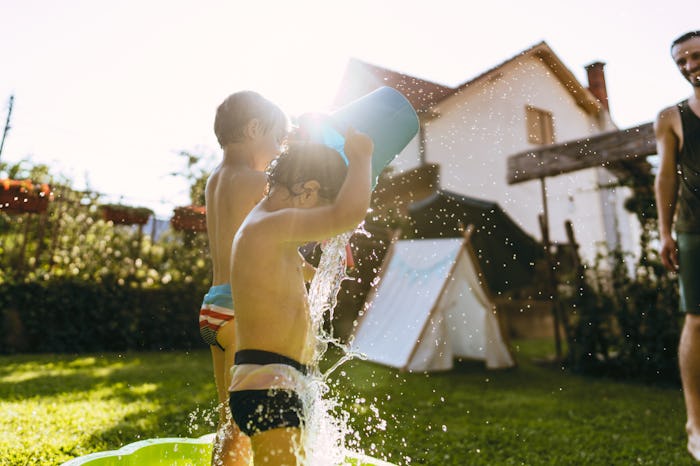Toddlers

So Your Kid Drank Gross Outdoor Water & You’re Panicking
Drinking from a kiddie pool, or even turning up your mouth to catch a raindrop, can be unhealthy. Here's why.
Toddlers can be spontaneous, emotionally driven beings. It’s all but inevitable that, at some point, they’re going to drop a remote control in the toilet, eat a fistful of sand from the local sandbox, and help themselves to a sip of water from the kiddie pool. Hey, they’re learning! So as we enter into a hopeful summer season filled with socializing, we examine one of the likely scenarios that comes with enjoying outdoor splash-time fun: What to do when your kid drinks stagnant outdoor water.
No need to banish the kiddie pools, sprinklers, and splash-pads. Maintaining water tables and any water-holding basin just requires some maintenance, like emptying and washing each water feature daily before setting it out to dry. This is one of the best ways to prevent the potential ingestion of bacteria via outdoor water. But if you do find yourself in a situation which you’re contemplating a call to your pediatrician, here are a few more facts to know about the safety of drinking outdoor water.
Sipping in the Rain: Is Rainwater Safe?
Watching a toddler stick out their tongue to catch a bit of rain can make an adorable mental picture. But cute doesn’t equal safe. The Centers For Disease Control and Prevention (CDC) shared that a water droplet can catch dirt, debris, or even smog on its decent from the sky. And if it hits your housetop or slides down a gutter before dropping into a barrel for collection, the bacterial possibilities are even less desirable, says Robert Brownwood, P.E. division of drinking water, California state water resources control board. As an example, Brownwood notes the possibility of water mingling with decomposing leaves on the way down a drainpipe. So if you’ve got water resting in a rain-catching barrel for an extended period of time, yes, it might be harboring bacteria or other potential pathogens, Brownwood tells Romper. “It’s probably fine for watering plants… but definitely you wouldn’t want to drink it.”
The bottom line? “Whether due to environmental pollutants, other chemicals, bacteria, parasites, or other contaminants, drinking rain water can definitely pose a risk to a child’s health,” says Dr. Richard Chung, associate professor of pediatrics at Duke University School of Medicine. “This risk increases further if rainwater has collected and remained stagnant for some period of time, particularly in warmer climates.” If you find water tables, toys, or even buckets filling up with rainwater around your home, make sure you empty them out before your toddler (or mosquito) finds them.
What happens if my child drinks old pool water?
Breaking it down, it’s good to note that water companies can treat water from different sources to make it safe before it travels into your home, as shared the CDC. Therefore, as it flows through the pipes for days, it’s not growing bacteria, says Brownwood. To learn more about the quality of your drinking water, and how it might be treated to keep away harmful bacteria (for example, if chlorine or chloramine is brought into the water as a disinfectant, explained the CDC), check out a report on your local water supply. If you steal a sip from the hose, you’re likely going to be OK. But some bigger health issues can arise if someone drinks water that’s been sitting outside for some time in, say, a water table or kiddie pool.
There are many ways that the water in inflatable pools can lead to potential illness. “Any stagnant collection of water poses a risk of infection if ingested,” says Chung. But when children are brought into the equation, and they play in and around the water, Chung tells Romper, “entry of bacteria and other contaminants is inevitable.” Consider that fecal matter can transmit germs, as can vomit. The CDC shared that such germs that can prompt diarrhea or vomit can include Escherichia coli, and shigella. After a day, there’s really nothing to kill any bacteria or viruses that could be in that water, Brownwood tells Romper. Simply put, drinking it may lead to sickness.
What can I do to prevent my kids from drinking old, outdoor water?
Simply follow them around all day with a tall, cool glass of filtered water, complete with crazy straw. Obviously.
Ha! Can you imagine? A better idea is to keep eyes on kiddos as they play near any water feature, and make sure to clean out all playtime water structures, like pools, pads, slides and tables, after each use, and definitely at the end of every day. What not to do? Don’t spike your pool water with chemical germ-killers such as bleach or chlorine; it won’t work for several reasons, shared the CDC.
And if a child does ingest any significant amount of rainwater or other stagnant outdoor collection of water, Chung says, “caregivers should monitor closely for any signs or symptoms of associated sickness. If a child is going to get sick from such an exposure, symptoms could arise within a few hours or even up to days later. The most likely clues will be gastrointestinal symptoms such as nausea and stomachache, or physical signs such as vomiting or diarrhea. If these occur, the child should be seen promptly for medical assessment.” And remember, a call to a child’s healthcare provider can be helpful if or when you think an exposure like this could have occurred, so you can gauge the situation and monitor appropriately.
Experts:
Robert Brownwood, P.E. Division of Drinking Water, State Water Resources Control Board, Assistant Deputy Director of the Program Management Branch (with the California Water Boards)
Dr. Richard Chung, associate professor of pediatrics at Duke University School of Medicine.
This article was originally published on